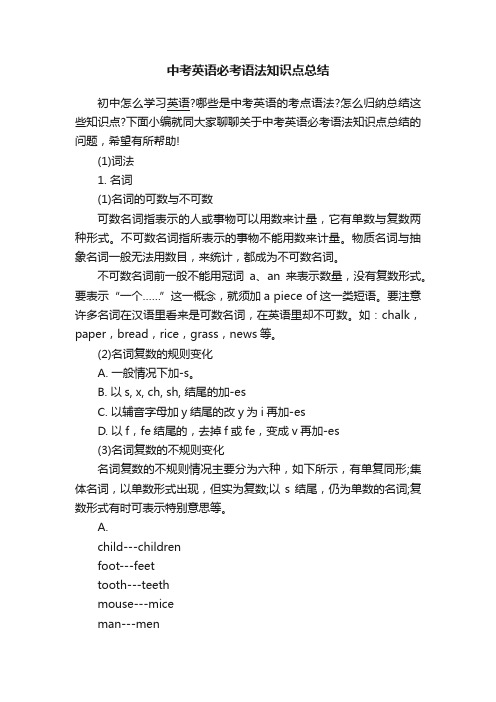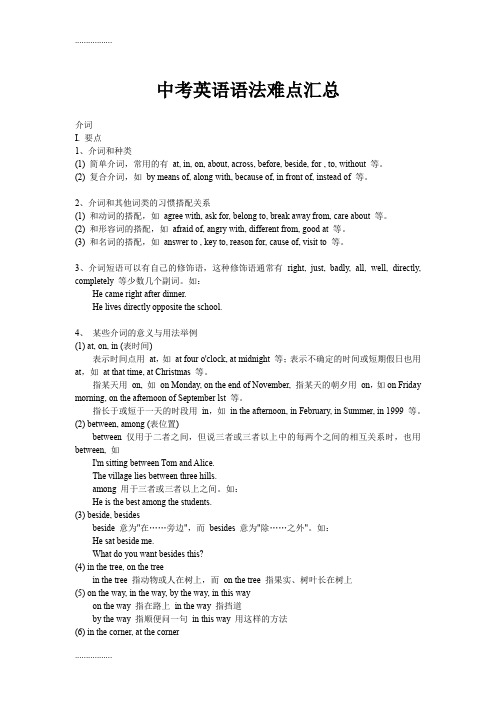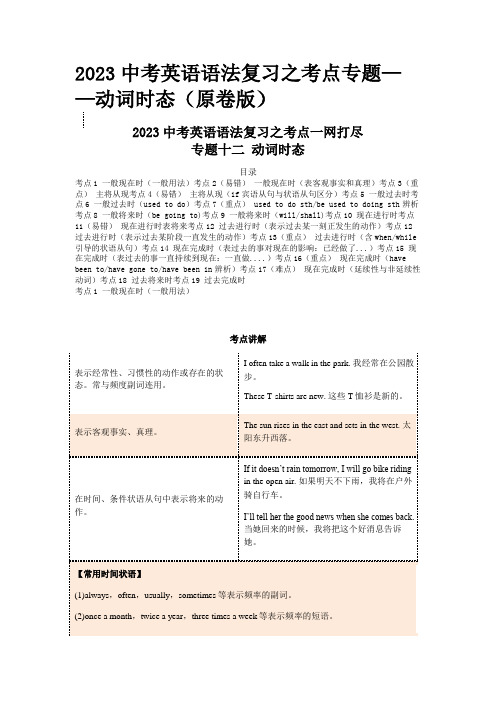中考英语语法考点(1)
中考英语必考语法知识点总结

中考英语必考语法知识点总结初中怎么学习英语?哪些是中考英语的考点语法?怎么归纳总结这些知识点?下面小编就同大家聊聊关于中考英语必考语法知识点总结的问题,希望有所帮助!(1)词法1. 名词(1)名词的可数与不可数可数名词指表示的人或事物可以用数来计量,它有单数与复数两种形式。
不可数名词指所表示的事物不能用数来计量。
物质名词与抽象名词一般无法用数目,来统计,都成为不可数名词。
不可数名词前一般不能用冠词a、an来表示数量,没有复数形式。
要表示“一个……”这一概念,就须加a piece of这一类短语。
要注意许多名词在汉语里看来是可数名词,在英语里却不可数。
如:chalk,paper,bread,rice,grass,news等。
(2)名词复数的规则变化A. 一般情况下加-s。
B. 以s, x, ch, sh, 结尾的加-esC. 以辅音字母加y结尾的改y为i再加-esD. 以f,fe结尾的,去掉f或fe,变成v再加-es(3)名词复数的不规则变化名词复数的不规则情况主要分为六种,如下所示,有单复同形;集体名词,以单数形式出现,但实为复数;以s结尾,仍为单数的名词;复数形式有时可表示特别意思等。
A.child---childrenfoot---feettooth---teethmouse---miceman---menwoman---women注意:与 man 和 woman构成的合成词,其复数形式也是 -men 和-women。
如:an Englishman,two Englishmen. 但German不是合成词,故复数形式为Germans;Bowman是姓,其复数是the Bowmans。
B. 单复同形如:deer,sheep,fish,Chinese,Japaneseli,jin,yuan,two li,three mu,four jin但除人民币元、角、分外,美元、英镑、法郎等都有复数形式。
如:a dollar, two dollars; a meter, two metersC. 集体名词,以单数形式出现,但实为复数。
初中中考英语语法知识点(1)

英语语法知识难点(一)II.例题(一)形容词和副词I.要点A.形容词1、形容词的用法形容词是用来修饰、描绘名词的,通常在句中作定语、表语或宾补,有时还可作状语。
如:He is honest and hardworking.I found the book interesting.某些形容词与定冠词连用表示一类人作主语时,谓语通常用复数形式。
如:The rich and the poor live in different parts of the city.The English like to be with their families.多个形容词作定语修饰名词的顺序:冠词+序数词+基数词+性质状态(描述性)+形状大小+新旧老少+颜色+国籍+材料+名词。
如:the second five interesting big new red Chinese wall papers.2、形容词比较等级的形式(1)规则形式一般说来,单音节词及少数双音节词在后加-er;--est 来构成比较级和最高级;其他双音节词及多音节词在前加more, most.如:great-greater-greatestbusy-busier-busiestimportant-more important-(the)most important(2)不规则形式good (well)-better-bestbad (ill)-worse-worstmany (much)-more-mostlittle-less-least(3)形容词比较等级的用法①表示两者的比较,用形容词的比较级+than. 如:He is cleverer than the other boys.This one is more beautiful than that one.②表示两者以上的比较,用"the +形容词最高级(+名词)+of(in) …"如:He is the cleverest boy in his class.③表示两者是同等程度,用"as +形容词原级+as". 如:He is as tall as I.I have as many books as you.④越…越…例如:The more I learn, the happier I am.⑤ You can never be too careful. 越小心越好又如:You can never praise the teacher too highly.你怎么赞扬这个老师也不过分。
中考英语语法知识专题(1)名词、名词所有格课件(含答案)

—They are very beautiful! You’ve got a wonderful__________.( C )
A. instruction
B. description
C. collection
3.(2016·中考改编)—My favorite TV________is A Bite of China(舌尖上的中国).
物质 名词
抽象 名词
食物 饮料 自然物质 情感 概念 学科,语言
bread,meat,rice,cheese,fish,beef water,tea,coffee,wine,milk,cola wood,sand,soil,air friendship,peace,joy,love news,population maths,physics,geography,English
第三篇 语法知识专题
第一节 名词/名词所有格
名词 (一)名词的分类:名词是表示人或事物名称的词。它分为专有名词和普通名词。
类别
定义
例词
专有名词
表示具体的人名,事物, China,the Great 地名,组织等名称的词。 Wall
可数 普通
名词 不可
数
个体名词 集体名词 物质名词 抽象名词
表个别人或事物的名称 表若干人或事物的名称 表物质或材料的名称 表感情等抽象概念的名称
情况
特殊 名词
构成方法 变内部元音
单复数同形 完全不规则
例词 man—men,woman—women,foot—feet,tooth—
teeth Chinese,Japanese,sheep,deer,fish (中国人和日本人喜爱绵羊、鹿和鱼) penny—pence,child—children,mouse—mice
中考英语-语法-简单句(一)

(梧州中考)
—______ students are there in your class?
—Fifty.
A. How many
B. How much
C. How long
D. far
解析:考查选择疑问句。how many 意为“多少”,后面修 饰可数名词复数形式;how much意为“多少”,后面修饰 不可数名词;how long意为“多长;多久”,用于询问物体 或时间的长度;how far意为“多远”,用于询问距离。 students 是可数名词复数,故选how many。 答案: A
W___h_y__are you so excited about it? 你为什么对此那么激动?
反意疑问句
反意疑问句由“陈述句+简略疑问句”两部分组成,第一部 分提出一种看法,第二部分用来质疑或表示证实。陈述部 分与疑问部分的动词时态和动词性质应保持一致,而且肯 定和否定形式彼此相反,即陈述部分为肯定式时,疑问部 分用否定式;陈述部分为否定式时,疑问部分用肯定式。
We saw e_v_e_r_y__th__in__g i_n__g__o_o_d__o__rd__e_r.我们看到所有的东西都井井有条。 宾语 介词短语作宾补
Our teacher told u__s_t_o__c_o_m___e early tomorrow.我们老师叫我们明天早来。 宾语 不定式作宾补
倒装句
N__e__v_e_r shall I do this again. 我再也不会这样做了。 3. 用于no sooner than, hardly when和not until的句型中。
N__o__t_u_n__t_il__th__e__te__a_c_h_e_r__c_a_m__e_ did he finish his homework. 直到老师来了他才完成作业。
考点01 冠词(考点详解)-备战中考英语考点微专题

考点01 冠词冠词三兄弟(a/ an;the)的任务就是给名词“戴帽子”。
语法上,它们是虚词,没有词义,也不能独立担任任何句子成分,只能附着在一个名词上,在名词前使用,帮助表明词义。
冠词分为两类:不定冠词a(an)和定冠词the。
不定冠词a(an)只能用于单数名词之前,表示“一”的意思和该名词的不特定性。
定冠词则强调该名词的特定性,表示“这”,“这些”等意思,在可数名词与不可数名词之前都能使用。
考查题型:冠词虽小,只有a,an和the三个,但却是历年各地中考必考语言点之一。
就考查题型而言,以单项选择为主,有时在完形填空中出现。
从命题意图看,以考查不定冠词a和an的用法区别、不定冠词和定冠词的用法区别为主。
同时考查冠词的各种不同用法。
考查重点:冠词的考查重点包括不定冠词a和an的用法,定冠词the的用法和零冠词的用法等。
其中,不定冠词与定冠词的用法区别以及在具体语言环境中冠词的应用是历年中考试题考查的热点,也是今后的考查方向。
一、不定冠词的用法。
二、定冠词的用法。
三、不用冠词的情况。
一、冠词的概述1、冠词的定义:冠词是用来表示名词特性的一种词,它表示名词可数还是不可数、单数还是复数、任何一个还是特定的一个等。
也就是说,冠词与名词是紧密连在一起的。
冠词主要放在名词之前,说明名词所表示的人或物,它不能离开名词而单独存在。
2、冠词的种类:(1)不定冠词:有a/an 两种形式。
“a”用在以辅音音素开头的词前面,“an”用在以元音音素开头的词前面。
判断一个词是以元音音素开头还是以辅音音素开头,是根据读音而不是根据字母。
(2)定冠词:只有the 一种形式。
3、冠词的泛指、特指和类指的用法:(1)泛指:指首次提到的、不限定的人或物。
(2)特指:指上文已提到的人或物,或是指被限制性修饰语在其后加以限定的人或物,也可以是指说话者双方都清楚的特定的人或事物。
(3)类指:表示类别4、冠词的用法:定冠词的用法口诀冠词基本用法【速记口诀】名词是秃子,常要戴帽子,可数名词单,须用a或an,辅音前用a,an在元音前,若为特指时,则须用定冠,复数不可数,泛指the不见,碰到代词时,冠词均不现。
中考英语语法讲解(1)——名词

初中中考英语语法专题讲解名词要点归纳1.名词——表示人或事物的名称或抽象概念的词。
2.名词的分类:专有名词:表示的是某一特定的人、事物、地方、团体、党派、国家机关、语言、节日等专有的名称。
例:China, Chinese, Sunday, May, Smith, Christmas, Shanghai等。
专有名词书写时首字母一定要大写。
普通名词:表示某一类人或事物,或某种物体或抽象概念的名称。
如:teacher, blackboard, shipschool, family, meat, water, duty, work等。
可数名词:表示的人或事物可以用数来计量,有单数与复数两种形式。
例如:glass, man, bird,desk, book等。
不可数名词:所表示的事物不能用数来计量。
物质名词与抽象名词一般无法有数目计量,都称为不可数名词。
一般只用单数形式,不能在前面加a或an来表示数量。
例如:paper, rice, water, milk, tea等。
3.名词的数可数名词有单数和复数两种形式。
单数表示一个人或事物,复数表示一个以上的人或事物。
名词单数变复数的形式有规则变化与不规则变化之区别。
4.有关名词数的几个注意事项1.以s sh ch x 结尾的词,加es 如:buses dishes watches boxes2.元音字母o结尾的词,特别是常用词,有生命+es, 无生命+s. 如:Heroes, potatoes, omatoes, hippoes,Photos, videos, radios, pianos以oo结尾的不管有无生命都加s 如zoos.3.以f,fe结尾的词1) 通常变f 为v,再加-es。
如:half—halves, leaf—leaves, wife—wiveslife—lives等2)下列词只加s如: roofs,chiefs3) 有些词加s或es均可.如: scarf, handkerchief等4. 不规则复数形式1)改变元音字母。
(整理)中考英语语法考点

中考英语语法难点汇总介词I. 要点1、介词和种类(1) 简单介词,常用的有at, in, on, about, across, before, beside, for , to, without 等。
(2) 复合介词,如by means of, along with, because of, in front of, instead of 等。
2、介词和其他词类的习惯搭配关系(1) 和动词的搭配,如agree with, ask for, belong to, break away from, care about 等。
(2) 和形容词的搭配,如afraid of, angry with, different from, good at 等。
(3) 和名词的搭配,如answer to , key to, reason for, cause of, visit to 等。
3、介词短语可以有自己的修饰语,这种修饰语通常有right, just, badly, all, well, directly, completely 等少数几个副词。
如:He came right after dinner.He lives directly opposite the school.4、某些介词的意义与用法举例(1) at, on, in (表时间)表示时间点用at,如at four o'clock, at midnight 等;表示不确定的时间或短期假日也用at,如at that time, at Christmas 等。
指某天用on, 如on Monday, on the end of November, 指某天的朝夕用on,如on Friday morning, on the afternoon of September lst 等。
指长于或短于一天的时段用in,如in the afternoon, in February, in Summer, in 1999 等。
2023中考英语语法复习之考点专题——动词时态(原卷版)

2023中考英语语法复习之考点专题——动词时态(原卷版)2023中考英语语法复习之考点一网打尽专题十二动词时态目录考点1 一般现在时(一般用法)考点2(易错)一般现在时(表客观事实和真理)考点3(重点)主将从现考点4(易错)主将从现(if宾语从句与状语从句区分)考点5 一般过去时考点6 一般过去时(used to do)考点7(重点) used to do sth/be used to doing sth辨析考点8 一般将来时(be going to)考点9 一般将来时(will/shall)考点10 现在进行时考点11(易错)现在进行时表将来考点12 过去进行时(表示过去某一刻正发生的动作)考点12 过去进行时(表示过去某阶段一直发生的动作)考点13(重点)过去进行时(含when/while 引导的状语从句)考点14 现在完成时(表过去的事对现在的影响:已经做了...)考点15 现在完成时(表过去的事一直持续到现在:一直做....)考点16(重点)现在完成时(have been to/have gone to/have been in辨析)考点17(难点)现在完成时(延续性与非延续性动词)考点18 过去将来时考点19 过去完成时考点1 一般现在时(一般用法)考点讲解1.(2021·上海松江·二模)Tim likes watching films. He _________ to the cinema with his girlfriend once a week.A.goes B.is going C.has gone D.will go2.(2020·湖北恩施)I hear that it often ________ in Sichuan and there are usually floods, especially in summer.A.rains B.rained C.will rain3.(2021·北京房山·二模)Mary ________ her grandparents every weekend.A.visits B.was visiting C.is visiting D.has visited4.(2021·广西桂林)The zebra eats grass, but it ________ eat meat.A.doesn’t B.didn’t C.don’t5.(2021·黑龙江·齐齐哈尔市碾子山区教师进修学校一模)—Do you like the flower? —Yes. It ________ sweet.A.is smelling B.smells C.smelt考点2(易错)一般现在时(表客观事实和真理)考点讲解精选练习6.(2020·天津红桥·二模)In the past, people didn't know the earth ________round the sun. A.going B.goes C.will go D.go7.(2021·吉林长春·模拟预测)The teacher told us that the sun ________ in the east. A.rises B.rise C.rose D.rising考点3(重点)主将从现考点讲解精选练习8.(2021·四川乐山)—What’s your plan for the summer holiday?—I’ll go to Chendu as soon as the school term ___________.A.end B.ends C.will end9.(2021·广西河池)Mrs. Green will take her son to the amusement park if she ________ the tickets.A.got B.gets C.is getting D.will get10.(2021·辽宁丹东)We can’t avoid traffic accidents unless everyone ________ the rules. A.follows B.breaks C.will follow D.will break考点4(易错)主将从现(if宾语从句与状语从句区分)考点讲解精选练习11.(2021·辽宁鞍山)—Tina wants to know if you ________ to the park with us tomorrow. —I’d love to. But if it ________, I may go to the library instead.A.go; will rain B.go; rains C.will go; rains D.will go; will rain12.(2020·黑龙江牡丹江)—I wonder if we ________a farewell party next week. —If we________it, I will call you.A.will have ; have B.have;will have C.will have; will have13.(2021·黑龙江哈尔滨)—I wonder if you ________ us for the English party tomorrow. —If I ________ free, I will go with you.A.will join, am B.will join, will be C.join, am考点5 一般过去时考点讲解精选练习14.(2021·广西贵港)—Where does Bill live? —He ________ me his address, but I can’t remember it now.A.tells B.told C.is telling D.will tell15.(2021·四川达州)— Alice has gone out. — Oh, has she? What time ________ she________?A.has; gone B.will; go C.did; go D.is; going16.(2021·江苏徐州)In my school days, I ________ a lot of reading in English every day. That was how I learned English at that time.A.do B.did C.have done D.will do17.(2021·重庆)Last Sunday my brother and I ________ our grandparents.A.will visit B.visits C.visit D.visited18.(2021·内蒙古兴安盟)— Have you ever been to Shanghai? — Of course. Actually, I________ there for six years, but now I live in Beijing.A.worked B.was working C.would work D.have worked考点6 一般过去时(used to do)考点讲解精选练习19.Mr Jiang isn’t as busy as before because there ___________no home robot to help him.A.used to be B.may be C.used to have D.may have20.I ________ in this small mountain village when I was a child.A.use to live B.used to living C.used to live D.used to life21.(2019·江苏镇江)Yao Ming, a basketball giant , ___________ water polo when he was young.A.is playing B.used to play C.is used to playing D.was playing考点7(重点) used to do sth/be used to doing sth辨析考点讲解精选练习22.(2020·湖南益阳)Diana used to _________ to work, but now she is used to ________ because the road is crowded and she wants to keep fit.A.drive; walk B.drive; walking C.driving; walk23.Dick __________ in America, but he has been ___________ Chinese food since he moved to China.A.used to live; used to eating B.is used to live; used to eat C.is used to live; used to eating D.used to living; used to eat24.—How does your brother go to school? —He ___________ ride a bike, but now he__________ there to keep fit.A.used to; is used to walk B.used to; is used for walking C.was used to; is used to walking D.used to; is used to walking考点8 一般将来时(be going to)考点讲解一般将来时表示将来某个时间要发生的动作,事情或存在的状态,也表示将来经常或反复发生的动作或事情。
